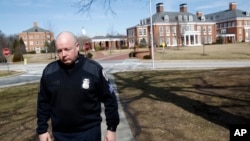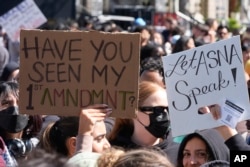Student Union
- By Hau Hoang
How to Speak English Fluently?
The most popular question I get from my friends in Vietnam is how to speak English fluently and correctly. I realize that it is a aching question that not just my friends, but also learners of this global language are trying to answer. In my case, even though I was taught English since the beginning of middle school in Vietnam, the things I learned then were barely adequate to carry out a conversation or even write up a letter in correct grammar.
In 9th grade, I decided to focus on studying English intensively on my own, which helped me land a scholarship to study in America through an exchange program – a thrilling turn for my education.
Obviously, being in the native speaking environment was a golden advantage, but at the same time, I still had to study and practice the language. By the end of high school, I was very confident with my English skills. All of my hard work paid off even more in college, because the classes at St. John’s College are discussion-based, so there’s a lot of talking.
Here are some of the things that worked for me when I was learning English. Since everyone has a different learning style, what worked for me won’t necessarily be best for you, but hopefully this will at least help you along.
Listen as much as possible
As I recall, the pronunciation I was taught in middle school in Vietnam are mostly incorrect. This is a common case because English pronunciation is not at all straightforward. There is nothing like the difficulty in trying to pronounce some of English's most difficult words. For me, the toughest words to master were words like "weird," "judge," and "noodle."
What helped was listening to native English speakers as much as possible, either through tapes, CDs, movies, or most prominently, the internet. I’m not exaggerating in saying that American movies and music were my principal English teachers in 9th grade. I would buy CDs of Westlife and Britney Spears, download the lyrics and sing along to the songs. And once in a while, my sister would bring me from Hanoi DVDs of American movies which I would watch over and over, and practice reading the subtitles along with the actors. I can still recite word-by-word the whole script of Mean Girls.
In this way, my English study was basically an immersion, though indirect, in the English language as well as the American culture. My pronunciation and speaking skill therefore improved very quickly. I got to learn the real English – what real Americans say to each other in everyday life; for example, saying "How are you doing?" instead of the ordinary "How are you?"
Judge yourself
When you practice speaking by repeating along with a recording, be somewhat hard on yourself, try to imitate as close as possible to the speaker's pronunciation, and most importantly, the intonation of the sentence - this will help you carry out a more natural and smooth conversation in English.
It is also very helpful to have a dictionary with International Phonetics Alphabet (IPA) pronunciation (I recommend Oxford, Macmillan, or Dictionary.com for those who have home internet access). Of course, the first step would be to learn how to read the IPA symbols (some YouTube videos can help teach you that). I always use this guide to learn the pronunciations of new words, and also to make sense of the pronunciation in the recording.
Specifically, by looking at the "anatomy" of the pronunciation, you will be able to greatly improve your pronunciation. For example, since Vietnamese words all have one syllable, a lot of Vietnamese pronounce the word “hôm” for “home” since their sounds are seemingly equivalent. When you look up the IPA pronunciation of this word, however, you will see that it actually consists of two syllables /ho-ʊm/. As a result, you should practice perfecting your pronunciation by saying the two syllables separately and quickly. Eventually it will become an instinctive thing to pronounce “home" in that correct manner.
Variety is key
For me, the key to speaking English fluently is sentence structures. The more structures you know, the more comfortable you will be when trying to express your thoughts.
My advice would be try to master the fundamental structures - “for example,” “I think that,” “it is interesting that,” “I find it,” “it is better to,” “not only … but also” - by practicing them over and over. A good familiarity with the structures will help with the coherence of the conversation.
As you expand your knowledge in sentence structures, it is also important to augment your vocabulary. It is always wise to constantly try new words in conversation due to the mutual relationship between speaking and learning new words: you need more words to express your thoughts precisely, and at the same time, it is easiest to learn new words when they are uttered and put in context.
Learning to speak English fluently is a difficult task. On top all of the tips I listed above, my final advice would be to practice as much as possible because really, practice makes perfect. Good luck everyone!
See all News Updates of the Day
- By VOA News
Studying STEM? International students have funding options

US News & World Report takes a look at funding options for international students pursuing STEM degrees in the U.S.
The article explains the different kinds of scholarships and grants and offers tips on getting part-time jobs and private student loans. Read the full story here. (March 2024)
- By Robin Guess
US campuses are battlegrounds in free speech debate

This week the University of Southern California canceled the graduation speech of its senior class valedictorian at a time when there is a growing debate over the limits of free speech on American college campuses.
USC’s Asna Tabassum, a Muslim biomedical engineer major, was selected from among 100 outstanding students to address the graduating class of 2024 this May. However, the school withdrew the invitation for her to speak at the graduation ceremony citing safety concerns.
Tabassum denounced the decision, which she attributed to her public support for Palestinian human rights. She said it is part of “a campaign of hate meant to silence my voice.”
The school maintains it is a safety issue, not about free speech. School officials say they received an alarming number of violent threats after selecting her as speaker.
USC is one of many American universities that have struggled with policies over free speech and campus protest since October’s Hamas terrorist attack on Israel and the continuing fighting in Gaza. After weeks or months of on-campus protests and rallies, schools have been taking more forceful action to punish protesters who administrators say have become disruptive.
On Thursday at Columbia University in New York, police arrested more than 100 students who had gathered on campus for pro-Palestinian protests. The school’s dean wrote that the protesters had been told several times that they were violating university policies and would be suspended. The students say they were exercising their free speech rights.
At Washington’s American University, protests in all campus buildings have been banned by the school’s president since January. Under the new policy, students may not hold rallies, engage in silent protests or place posters in any campus building.
Protests and safety
University students have a long history of engaging in political activism. From the Vietnam War to abortion rights, universities have played a key role in American political debates.
However, students now say that schools like AU with a long-standing protest culture are silencing protesters with new rules.
Arusa Islam, American University student body president-elect and current vice president, says the policies are preventing an open discussion about U.S. foreign policy.
“Indoor protesting was never a problem, it was never an issue before October 7th,” Islam said. “Students were allowed to put up posters in buildings and students were allowed to have a silent protest.”
“And now we don’t have that right anymore,” she added. “We have been silenced and it is affecting us greatly.”
American University’s president, Sylvia Burwell, says the school’s new policies are intended to ensure that protests do not disrupt university activity.
Burwell also referred to recent events on campus that “made Jewish students feel unsafe and unwelcome.” She added, antisemitism is abhorrent, wrong, and will not be tolerated at American University.
While administrators insist that they are making narrow restrictions in the interests of providing an education, critics say the policies have a far-reaching effect.
At Cornell University, where new rules took effect in January, Claire Ting, the executive vice president of the Cornell Student Assembly, said the policies have had an unsettling effect on campus.
“The campus climate at Cornell has been tense surrounding free speech in recent times,” Ting emailed VOA.
Ting said that both students and faculty feel the policy has had chilling effects on free expression.
“Students report facing arbitrary, escalating punishment for violating the policy, with the policy itself lacking clear outlines for the consequences of civil disobedience,” she added.
In its new policy Cornell warns students that disciplinary action may be taken if protests impede people or traffic, damage school property or interfere with the school’s operations in any way.
In its campus-wide notice explaining the new guidelines, the school wrote that the new policy would ensure that expressive activity is allowed but must remain nonviolent.
The Foundation for Individual Rights in Education, also known as FIRE, has tracked free speech issues on American campuses.
FIRE and College Pulse have produced an annual survey, since 2022, ranking colleges based on their policies and what students say about the free speech climate on campus.
This year the group reported that “alarming” numbers of students say they self-censor or “find their administrations unclear” on free speech issues.
“College campuses have always been places where students have been unafraid to express themselves and with the recent Gaza conflict after the 10/7 attacks, it’s been very heated on both sides of this issue,” said Zach Greenberg, the senior program officer of FIRE.
Harvard ranked last in this year’s survey. FIRE said the school punished some professors and researchers over what they had said or written, and students reported a poor climate for free speech on campus.
The controversy came to Congress late last year, when Harvard’s president testified over complaints of widespread antisemitism.
“I don’t think you’d find many students on campus right now that would say we are the model for flourishing free speech and ideas exchange in the country,” said J. Sellers Hill, president of Harvard’s school newspaper The Harvard Crimson.
“But I think you’ve really seen that be acknowledged by administrators and it seems to be something they are dedicated to taking on.”
As the head of The Harvard Crimson, Hill manages the paper’s 350 editors and 90 reporters, who’ve covered, in detail, the ongoing free speech/protests controversy and the resignation of former President Claudine Gay following her testimony to Congress.
“I think no one would dispute Harvard has work to do and progress to make,” Hill said. “I think it’s a tough sell, for me, that Harvard is uniquely in its own league in terms of intolerance of speech. That doesn’t square with what I have seen on our college campus or on other college campuses around the country. I think Harvard is held to a higher standard.”
Proposed settlement offered over financial aid allegations

A group of U.S. colleges and universities have agreed to settle a lawsuit alleging deceptive financial aid tactics, according to a report published in The Hill.
The schools would pay $284 million to plaintiffs who were enrolled full-time and received financial aid between 2003 and 2024.
The schools have denied the allegations. (April 2024)
Universities in Middle East building research relationships with China

As China bolsters research relationships with universities in the Middle East, the United States has taken notice – especially when that research involves artificial intelligence.
Reporting for University World News, Yojana Sharma has the story. (March 2024)
Tips for staying safe while studying in the US

Recent news events have raised safety concerns among some international students studying in the United States.
Adarsh Khandelwal, writing in the India Times, has tips for staying safe from the moment you arrive until the day you complete your studies. (March 2024)













